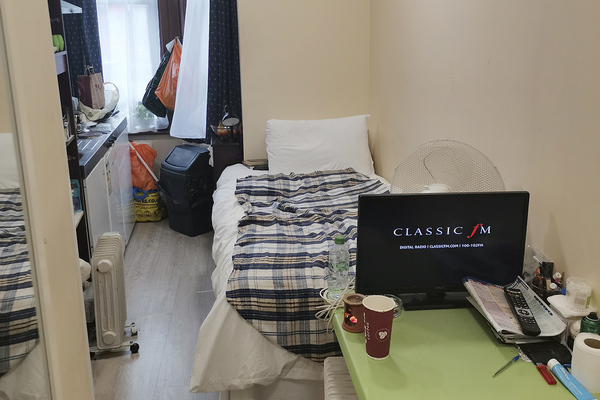You are viewing 1 of your 1 free articles
Refugees who become homeless in London after eviction from Home Office accommodation up 39%
The number of homelessness presentations made by refugees and asylum seekers evicted from Home Office accommodation has increased by 39%, according to new research by London Councils.
The cross-party group said the monthly increase amounted to 846 such homelessness presentations in October.
As a result, London Councils is warning that the number will rise even further in the coming months, as the government continues ramping up the number of asylum decisions and works to close several hotels by the new year.
The group said boroughs were struggling with a severe shortage of accommodation, while many reported having nothing to offer refugees who were sleeping rough.
It said this was exacerbated by the Home Office providing no funding to local authorities to support asylum seekers in hotels since April this year.
London Councils said it was concerned that a spike in rough-sleeping was even more dangerous amid winter conditions.
London’s severe weather emergency protocol (SWEP), which was triggered last week, was activated six times last winter, with around 2,000 placements made at short notice to help rough sleepers get off the streets.
Last year, accommodation shortages were so extreme that, for the first time, boroughs’ resilience teams were required to assist homelessness staff and volunteers in setting up rest centres across the capital.
London Councils is calling on the government to ensure a minimum 28-day notice period between an asylum seeker receiving both their asylum decision and biometric residence permit (BRP) and being required to leave Home Office accommodation.
The current process means that many are only being told a few days before receiving a notice-to-vacate letter.
The group is asking the government to extend the move-on period to 56-days, to align with the Homelessness Reduction Act and to give local authorities a “meaningful period” to mitigate homelessness risks.
It urged the government to address SWEP pressures and concerns, as councils do not receive any specific funding from the government for the activity.
Boroughs have also called for a halt to cessations of asylum support and evictions during the whole period of any SWEP activations.
London Councils is asking the government to fund a local wraparound support model that can be rolled out in all boroughs, and to increase enhanced rough-sleeping prevention grant funding.
It said that while it was positive that applicants were receiving decisions on their asylum cases, boroughs said there needed to be adequate housing arrangements in place to address the increase in demand.
It said closer coordination between the Home Office and councils was “essential” for securing appropriate housing, preventing homelessness and ensuring those granted asylum have the best opportunity to settle in the UK.
Grace Williams, London Councils’ executive member for communities, said: “No one wants to see refugees becoming homeless after leaving Home Office accommodation, but this is happening at an alarming rate across the capital.
“Boroughs are deeply concerned by the situation, which will only get more dangerous as winter sets in.
“Those granted asylum need adequate support for settling in the UK, yet too often are forced into sleeping rough on the streets.
“At a time when London already faces enormous and unsustainable homelessness pressures, the government urgently needs to prevent this happening.”
She said a longer move-on period for those leaving Home Office accommodation was “crucial”, along with funding for the councils whose local services provide support for those in need.
A Home Office spokesperson said: “We are committed to ensuring asylum claims are considered without unnecessary delays.
“Once someone is informed that their asylum claim has been granted, they get at least 28 days notice to move on from their asylum accommodation.
“Support is offered to newly recognised refugees by Migrant Help [a charity] and their partners, which includes advice on how to access Universal Credit, the labour market and where to get assistance with housing.
“We are working with local authorities to help communities manage the impact of asylum decisions as the legacy backlog reduces.”
Sign up for our homelessness bulletin
Already have an account? Click here to manage your newsletters












